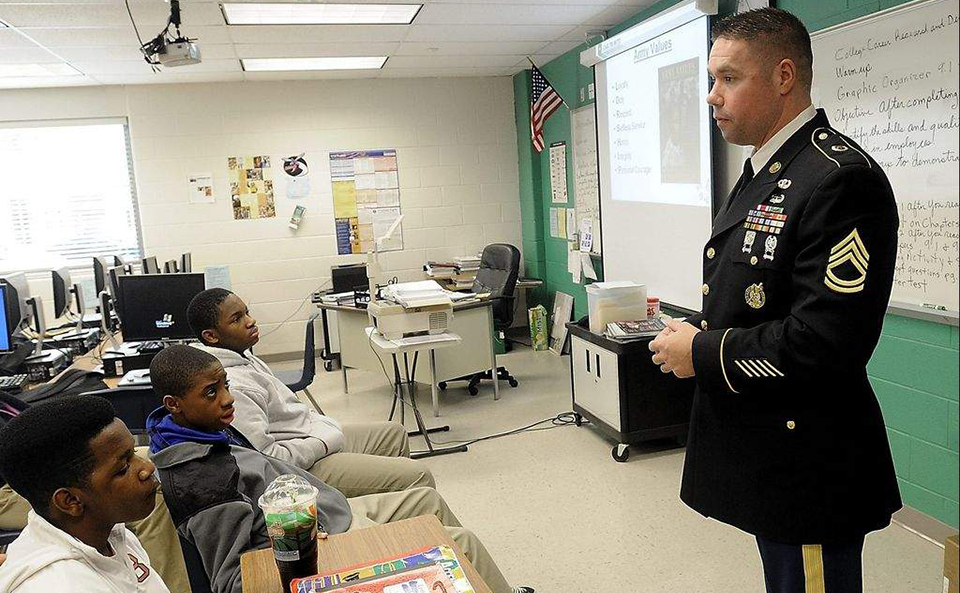
During the Iraq War years, pressure from students, parents and counter-recruitment activists forced a number of local school boards across the country to establish guidelines regulating military recruiter access to youth. Such policies are now in place in some of the biggest school districts in the country, including New York, Los Angeles and Fort Worth. In some cases, military recruiters are limited to two visits per year for each branch of the military. In others, they are not allowed to wander the school grounds unsupervised and have to be at their literature tables at all times. While policies vary from region to region, the idea is the same: to make sure recruiters do not overwhelm students with high-pressure sales techniques.
But since the end of the Iraq War, less attention has been paid to the issue. In the absence of public scrutiny, military recruiters have in recent years been using a variety of means to circumvent existing school recruiting policies. They volunteer at schools as coaches or teachers, and bend the rules to achieve “total access” to the schools in their recruiting zones. As a result, military recruiters are evading oversight despite warnings about unchecked recruiter access to youth from the American Public Health Association, New York Civil Liberties Union, and other advocacy groups.
When Johnny’s Gym Teacher is Also the Marine Recruiter
The high school in tiny Gaston, Ore., (pop. 600) has a policy governing the behavior of recruiters from the military, higher education, or employers. The policy, known as an “administrative rule on recruiters,” also permits parents and community members to “observe recruiting events,” which is how Helvi Smith, a local activist whose son attends Gaston High, found herself back in school this May.
According to Smith, who helped create the list of rules and lobbied the Gaston school board to have it passed, during a visit to the school on May 13, a young new Marine recruiter showed a determination to break or at least bend the rules. In her blog, she wrote: “They had an ‘ammo’ box that was filled with sand and got young boys to sign a waiver to see how many times they could lift it over their head in two minutes.”
Prizes like a Marine keychain were given away to any students who completed the lift. (Part of Gaston’s policy forbids recruiters from handing out prizes and gifts, unless they’re of “nominal value.”) The same recruiter came on two other occasions later that month, both times in a volunteer capacity. While the Gaston recruiter access policy forbids recruiters from talking about the military while volunteering, Smith observed this recruiter telling young male students that they’d “make great Marines!” while teaching them “military style group exercises” during a phys-ed class.
School Access: Vital to Military Recruiters
The Army’s Recruiter Handbook (http://www.usarec.army.mil/im/formpub/REC_PUBS/man3_01.pdf) notes that, “No other segment of the community network has as much impact on recruiting as schools.” Articles in the Recruiter Journal, a magazine published by and for Army recruiters, often refer to high schoolers as the recruiters’ “target market.” And as a top Marine recruiter has noted, “The future of the all-volunteer armed forces are seventeen-year-old male high school seniors.” Access to high schools is especially important in rural areas that lack the kinds of youth gathering places—like shopping malls or concert venues—that recruiters might fruitfully frequent in more urban areas.
For a military recruiter, the ideal is to have a “total access school,” where absolutely no restrictions are placed on recruiters. Recruiters have also described this as a state of “full integration” between recruiter and school, where the recruiter is no longer seen as a visitor but is now part of “the school’s family.” The Army’s School Recruiting Program Handbook has another, more sinister way of phrasing this: “school ownership.”
Perhaps not surprisingly, recruiters typically view grassroots efforts to regulate the military presence in schools as a threat. As one army analyst put it, such policies (if implemented) may limit recruiters’ ability to “provide an unobstructed conduit into the decision making cycles” of American youth. And so they must either be eliminated or avoided at all costs. Schools with recruiter access policies in place are termed “hard-to-penetrate” by the Army. According to documents posted online by the New Orleans Navy Recruiting District, any schools that limit recruiters’ access are “problem schools” that “must be reported and monitored,” and “continually tracked” by both regional and national Navy recruiting commands.
Wearing Them Down
While many branches of the armed services post their recruiter training manuals online, very little is known about what military recruiters actually do in school settings. If military recruiting in schools really is a “black box” (as two scholars who have studied the issue describe it), then I wanted to hear from someone who has peered inside. Brian Lagotte, an anthropologist who teaches at the University of Kansas, did his Ph.D on the way military recruiters interact with school officials. In an email, I asked him how recruiters responded to school access policies.
“Either recruiters do everything they can to enter the schools and meet with students stealthily, skirting teachers and administrators—sometimes just flat out sneaking in without notice—or they find the guidance counselor or administrator in charge of liaising with the military and, if that counselor is not sympathetic, basically wear them down until a more sympathetic counselor takes over,” Lagotte said.
“Basically, they pitch adults on how useful their presence is, and if they don't take the bait, they just evade at all costs. This is not the case for every recruiter, of course, but it is certainly a discernible pattern.”
And it is a pattern that can be discerned in the schools of Frederick County, Maryland, where a district policy limits military recruiters to four visits per year. According to an article in the Recruiter Journal, Staff Sgt. Joseph Payne found a clause that permitted recruiters to guest teach classes as long as they were invited by the school’s faculty.
Weeks later, he used his musical resume to line up weekly guest teaching gigs in the music classrooms of three Frederick County high schools. The enterprising Payne has advice for other recruiters who wish to match his success. “You can’t just show up to a high school and say, ‘I’m here to recruit!’ You have to show that you’re concerned and that you can help enhance the students’ education.”
Strengthening Military Recruiter Access Policies
In an interview, Janine Schwab, who in the late 2000s helped oversee the counter-recruiting campaigns of the American Friends Service Committee (a national peace advocacy group), placed such activities within a broader context: “One of the big achievements of the counter-recruitment movement is to get all these recruiter access rules in place,” Schwab said. “But what does that really mean, when this teacher has always been friends with the recruiter and they are bringing them in to do presentations?” The upshot, she says, is that “all these school districts really aren’t following their own rules.”
More parents and activists might have to do what Helvi Smith, the Gaston, Oregon parent, did and make sure that school rules allow for a community member or parent to be present during military recruiter visits. These watchdog roles are often assumed by counter-recruitment activists like Kathy Barker, an activist affiliated with Washington Area Truth in Recruiting.
Since 2007, Barker has been the military recruiter monitor for Seattle’s Garfield High School. Her position was officially part of the Garfield High Parent-Teacher-Student Association, which gave Barker a bit more clout. “As the monitor,” she wrote in an email, “I would make sure the recruiters signed in, that they weren’t wandering through the halls, and tried to get them to follow Seattle Public School policy.”
“We also organized to try to have someone,” she said, “who could be an unofficial monitor” of other high schools in the district.
“Because every single school always had recruiters who flouted policy.”
While renewed attention from parents and activists may help rein in overly aggressive recruiters, it won’t be enough. School officials will have to start taking seriously their obligation to protect students from trained salesmen bent on “total access” to their “target market.” As the editor of the Forest Grove Leader, Gaston’s hometown newspaper, said in June: “If schools are going to put out the welcome mat for military recruiters, they need to make sure the rules for such visits are clear and followed to the letter.”
3 WAYS TO SHOW YOUR SUPPORT
- Log in to post comments













